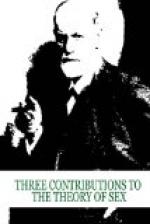Incest Barriers.—If the tenderness of the parents for the child has luckily failed to awaken the sexual impulse of the child prematurely, i.e., before the physical determinations for puberty appear, and if that awakening has not gone so far as to cause an unmistakable breaking through of the psychic excitement into the genital system, it can then fulfill its task and direct the child at the age of maturity in the selection of the sexual object. It would, of course, be most natural for the child to select as the sexual object that person whom it has loved since childhood with, so to speak, a suppressed libido.[8] But owing to the delay of sexual maturity time has been gained for the erection beside the sexual inhibitions of the incest barrier, that moral prescription which explicitly excludes from the object selection the beloved person of infancy or blood relation. The observance of this barrier is above all a demand of cultural society which must guard against the absorption by the family of those interests which it needs for the production of higher social units. Society, therefore, uses every means to loosen those family ties in every individual, especially in the boy, which are authoritative in childhood only.[9]
The object selection, however, is first accomplished in the imagination, and the sexual life of the maturing youth has hardly any escape except indulgence in phantasies or ideas which are not destined to be brought to execution. In the phantasies of all persons the infantile inclinations, now reenforced by somatic emphasis, reappear, and among them one finds in regular frequency and in the first place the sexual feeling of the child for the parents. This has usually already been differentiated by the sexual attraction, the attraction of the son for the mother and of the daughter for the father.[10] Simultaneously with the overcoming and rejection of these distinctly incestuous phantasies there occurs one of the most important as well as one of the most painful psychic accomplishments of puberty; it is the breaking away from the parental authority, through which alone is formed that opposition between the new and old generations which is so important for cultural progress. Many persons are detained at each of the stations in the course of development through which the individual must pass; and accordingly there are persons who never overcome the parental authority and never, or very imperfectly, withdraw their affection from their parents. They are mostly girls, who, to the delight of their parents, retain their full infantile love far beyond puberty, and it is instructive to find that in their married life these girls are incapable of fulfilling their duties to their husbands. They make cold wives and remain sexually anesthetic. This shows that the apparently non-sexual love for the parents and the sexual love are nourished from the same source, i.e., that the first merely corresponds to an infantile fixation of the libido.




